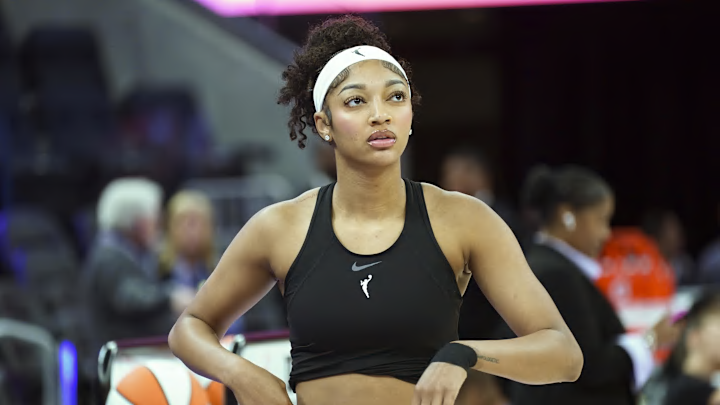In the rapidly expanding universe of women’s basketball, two names have created their own gravitational pull: Caitlin Clark and Angel Reese. Their supposed rivalry has fueled ratings, sparked endless debates, and brought unprecedented attention to the WNBA. But a recent business decision from an unexpected corner of the sports world has cut through the noise, exposing the stark differences in how the market values these two phenoms. When rapper and Big3 league founder Ice Cube extended a massive $5 million offer to Clark and then publicly confirmed he would not do the same for Reese, he wasn’t just making a choice between two players—he was delivering a masterclass in the brutal economics of modern stardom.
The story began when Ice Cube, in a bid to inject his league with mainstream star power, put a lucrative contract on the table for Caitlin Clark. The offer, which included salary, ownership stake, and merchandising revenue, was designed to lure the NCAA’s all-time leading scorer away from the WNBA, if only for a short time. Clark, focused on her burgeoning WNBA career, politely declined. But the story took a dramatic turn when TMZ caught up with Cube and asked if Angel Reese, Clark’s on-court nemesis, might be next in line for a similar proposal. His answer was swift and unambiguous: absolutely not.

Ice Cube’s reasoning was devoid of personal feelings and rooted entirely in commerce. He explained that the Big3, unlike the NBA-subsidized WNBA, is a business that must generate a profit. For a player to receive a multi-million-dollar deal, the league’s sponsors and investors need to see a clear path to a return on that investment. With Caitlin Clark, he stated, sponsors were ready to “unlock millions of dollars for the league.” The potential for new viewers, ticket sales, and merchandise was undeniable. When it came to Angel Reese, he admitted, “They didn’t tell us the same thing.”
This public declaration served as a sobering reality check, revealing the chasm between the two athletes’ brands. Caitlin Clark has cultivated an image built almost exclusively on transcendent skill. She is the quiet assassin who lets her record-breaking three-pointers and astonishing court vision do the talking. Her brand is about consistency, professionalism, and a singular focus on the game. She generates headlines for dropping 30 points, not for post-game drama. For sponsors, this represents a stable, blue-chip stock—a reliable investment with predictable, soaring returns.

Angel Reese, on the other hand, has built her brand on a foundation of attitude, swagger, and controversy. As the self-proclaimed “Bayou Barbie,” she embraces the role of the villain, thrives on conflict, and engages in clapbacks that energize her fanbase but alienate others. While her talent is evident, her reputation is often defined by off-court theatrics and performative rivalries rather than her stat line. For sponsors, this makes her a volatile asset. While she generates buzz, the noise is often accompanied by PR risks that many conservative brands are unwilling to take. The phone calls from potential sponsors, once ringing off the hook, reportedly grew quiet as her career became more about the spectacle and less about the sport.
The fallout from Ice Cube’s decision was immediate. A segment of Reese’s passionate fanbase directed their anger at the N.W.A. legend, accusing him of disparaging a Black woman and betraying his pro-Black identity. Yet, this narrative ignores the central, inconvenient truth: Cube’s league is a business venture, not a social program. His decision was based on data and sponsor feedback, not personal bias. In the world of high-finance sports, marketability is a currency as valuable as points per game, and right now, Clark’s is simply worth more.

The incident forces a deconstruction of the so-called rivalry. On the court, the matchup has been lopsided. Clark’s teams have consistently outperformed Reese’s, and her individual impact on game outcomes is statistically superior. The rivalry, it seems, exists more in social media comment sections and hot-take television segments than it does on the hardwood. Clark is a player you build a franchise around; Reese is a player who builds a social media following. While both are valuable, only one typically commands nine-figure television deals and multi-million-dollar endorsement contracts.
This isn’t to say Reese lacks appeal, but her appeal is different. It’s edgier, more niche, and carries a degree of volatility that makes corporate decision-makers nervous. While she was building an identity around the “you can’t see me” gesture, sponsors were seeing her all too clearly—and many were pivoting toward the safer, more bankable star in Caitlin Clark. The game doesn’t care about your follower count; it cares about your follow-through. When your reputation for drama begins to overshadow your reputation for clutch plays, the people with the checkbooks start to look elsewhere.
Ultimately, the Ice Cube saga is a lesson as old as professional sports itself: attention is temporary, but respect is currency. Angel Reese had the platform and the spotlight, but instead of leveraging it with consistent, undeniable excellence, she leaned into the chaos. She chose to fight battles in press conferences and on Twitter, while Caitlin Clark was quietly winning them on the court. Now, the consequences of those choices are playing out in the most public way imaginable. It’s a stark reminder that in the unforgiving business of sports, the scoreboard—and the bank account—never lies.